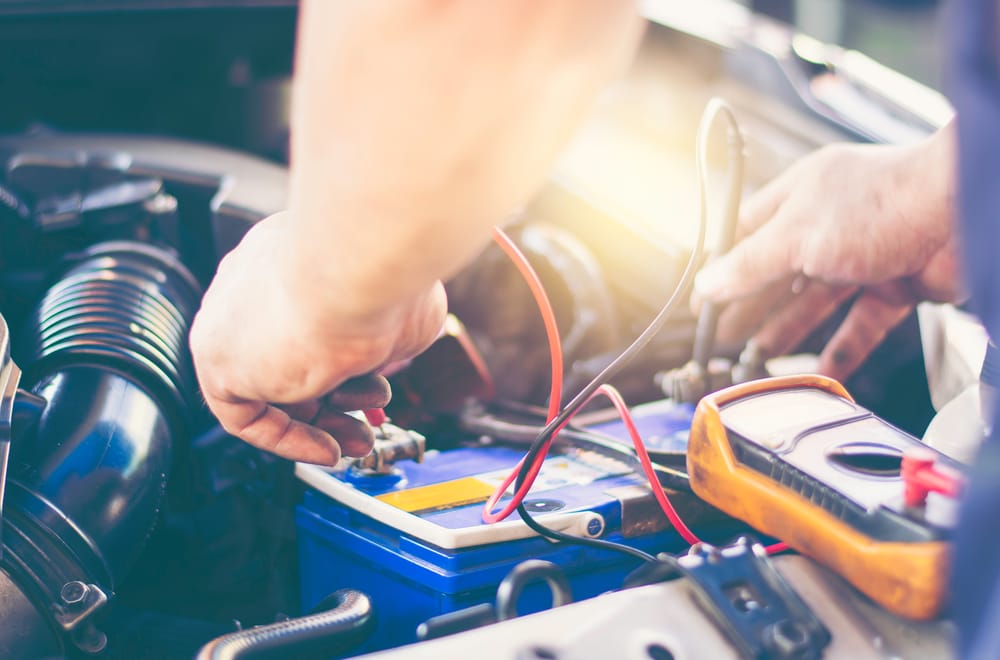Your Car Battery is Dead. Now What?

It’s a worse case scenario; you’re late for work and you hear the high, whining sound of a car that just won’t start. Your battery’s dead. Even if you’re not in this exact situation, a dead battery is not something any driver looks forward to handling. It happens to the best of us, though, so here’s what you need to know when your car battery dies:
How to Tell if Your Car Battery Dies
The first thing you need to do when you think your battery has died is determine if the problem is actually your battery. Your car’s starter, alternator, and battery work closely together, and it can be easy to mistake issues with one part with problems coming from another. Some signs it’s your battery that’s malfunctioning are:
- The check engine light flashes or stays on constantly. It’s a basic dashboard signal, but your check engine light is an indicator that something is wrong, and your battery is often the culprit.
- The ignition clicks or whines when starting. This is the sound of an engine struggling to turn over. One of the most important jobs of your car’s battery is to start the engine. When it doesn’t hold a charge, your engine can’t start.
- The radio doesn't turn on or your car’s lights don’t turn on/are dim. Your battery is what provides electricity to these parts after your car is started. If they’re not working, your battery could be close to dead.
- It smells like rotten eggs. Never a good sign, this particular scent when detected in or near your car means your battery is leaking gas and possibly sulfuric acid, which is a danger to other parts of your engine as well as you and your passengers.
- You pop the hood and see your battery is swollen. This is caused by the battery being overcharged by your alternator. While this causes the battery to not operate as intended, you should have both the battery and your alternator checked out if your battery is swollen.
What Causes Car Batteries to Die
- You used it when the car was idle. This could mean you left your lights or radio on, or your phone was plugged into a charging port when the car wasn’t actually running.
- The temperature dropped below 20 degrees. Cold weather will make most any vehicle’s engine turn over slowly, but this can more drastically affect battery life.
- The battery’s parts have been corroded. Car battery corrosion on either internal parts or on its outer terminals can reduce the battery’s ability to hold a charge.
- Your battery is over 3 years old. A battery can last you anywhere from 4-6 years depending on how well you take care of your vehicle. Still, batteries over 3 years old are more susceptible to other issues listed here.
What to Do if Your Car Battery Dies
The easiest way to overcome a dead battery, at least in the short term, is to jump start it using a pair of jumper cables and another operating vehicle.
How to Jump Start a Car:
- Take out your jumper cables. (We recommend keeping a set in your trunk!)
- Place both vehicles in Park or Neutral, with the parking brake on, and shut off the ignition in both cars.
- Attach one of the red clips to the positive terminal of your battery and the other red clip to the positive terminal of the other car.
- Then, attach one of the black clips to the negative terminal on the other battery.
- Lastly, attach the last black clip to an unpainted metal surface on your car that isn't near the battery.
- Once the two vehicles are properly connected, try to start your vehicle.
- If it won't start, make sure that the cables are properly connected and wait about 5 minutes.
- Try starting your car again. It should turn over now, but if it doesn't, your battery may be beyond jump starting and you’ll have to call for a tow truck or an alternative ride to wherever you need to go.
It’s important to remember to disconnect your cables in the reverse order that you connected them and to keep your car running for 40 minutes following the jump start. This will allow your alternator time to recharge your battery fully and prevent this situation from happening again the next time you go to start your car.
If you aren’t in a position to ask someone for a jump, you should call your roadside assistance provider - even if you’re stuck in your own driveway. Many roadside assistance operators can help you diagnose your car troubles, and either help you restart your car battery or tow you to the nearest auto repair shop to take care of more serious issues.
If you’ve experienced issues when starting your car, contact your local Metro Motor repair shop for help getting your car back to top performance.
Vehicle care information made available by Metro Motor is presented as helpful advice for general maintenance and should not be construed as instructions for at-home vehicle service. Be sure to consult your owner’s manual and a licensed, professional mechanic for diagnostics and repair.
